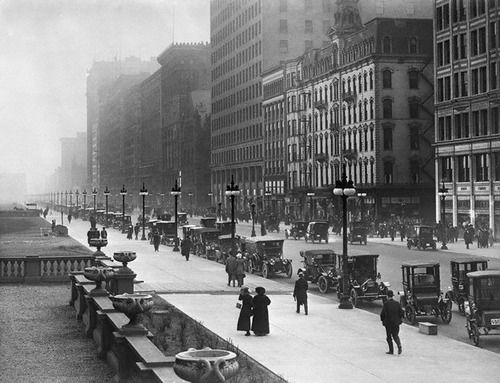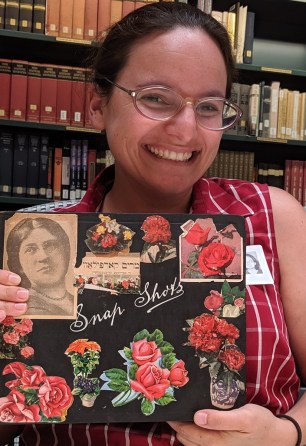
(from Di Varheyt, 1918)
When a Chicagoan sets out to show you around Chicago, he wants you to be astounded. If you aren’t impressed, he gets angry. When you tell him that you can see this or that in New York too, he gets irritated and says that New York is one thing, but Chicago is another thing entirely. Any person with half a brain should be able to keep from mixing them up.
“New York,” says the Chicagoan, “does not have anything over Chicago. Chicago has nothing to be ashamed of in comparison with New York. Of course not. It has much to be proud of. It’s right in the middle of all the states. From Chicago you can travel further West, East, South, or North. But where can you travel from New York? Tell me, where?”
And without letting you answer, the Chicagoan talks on and on about Chicago until he runs out of words. Then you can seize the opportunity to ask a question about all the smoke: “What’s the story with all thick black smoke that covers all of Chicago and even its sky? There’s no smoke like this in New York…”
“The smoke,” he answers, “comes from the white coal they use here. It’s cheaper. But that’s why they have such wide boulevards and so many parks. And have you seen the pier? What do you think of the broad, long streets?”
Since you have nothing to say about the broad, long streets, you keep quiet. Then you remember something. You say: “But do you have a cultural center?”
That’s enough. You don’t need to say any more. As soon as you say this, you can be sure that that you’ll be listening to him talk for a long time.
“What do you mean, do we have a cultural center?” he cries. “You mean do we have a literary café? Fine, so we don’t have one. And it would be better if you didn’t have one either!”
“Why?”
“Why?! All it does is make you all miserable, starving and bitter. What do we need that for? We don’t want it. We can do just fine without it. “’Cultural center!’ No one here is going to off himself because we don’t have a ‘cultural center!’ Everyone here has his own center!”
Chicago, dear esteemed editor, is a city like a married woman. She’s settled down. She stays at home and keeps to herself and doesn’t care much for the world outside. There are some members of her large family who aren’t comfortable this way and who want to go out into the wide world but for various reasons they feel that they can’t do this. They try to bring a bit of culture into their environment, for the sake of their own happiness. But not everyone is always happy with this. The local thinkers complain that the people in their own city aren’t interested in them. Instead they bring in famous authors from New York that you have to read up on. These poor underappreciated artists are tired of the moral decline in their city. They’re so tired of it all!
There was an evening in honor of Yehoash. Hundreds of men, women, and children gathered in a hall without electricity. And they were practically glowing (not from pride, but from overheating) as they stared adoringly at their guest. For almost an hour their convener lectured them about why such and such a person was missing from the audience. Those in attendance had to suffer on behalf of those who missed the gathering. And this was just the usual kind of literary evening they have here. The audience who came to listen to the famous poet and the organizers for the evening (Poale Tsiyon) were in a restaurant with a lot of tables. One table was laid out for a banquet in honor of the guest. Everyone sat around the long table and stared at the door with the patience of martyrs. They stared at the doorway where the guest was supposed to enter accompanied by the organizing committee. They watched the door for a long, long time, but he never came. They took to their very light repast from the restaurant (without waiting for the waiters) like desperate refugees.
“That’s how it goes,” one of them was heard complaining, “we brought him here but he couldn’t be bothered to eat at our table. He went off to be with the rich people. We had to pass the evening with the seat of honor empty! He shouldn’t have gone with them. He should have shown us at least that much respect, since we were the ones who invited him. The least he could have done was sit for a while at our table!”
“They must have better food,” a poet replied with an ironic tone. “What does he care about us? After all, he’s the model of success…”
“He didn’t even have to work at it,” a third cried angrily. And a fourth nodded, concluding, “No more! We won’t help to bring any of those big, important names anymore!”
Don’t you think, esteemed editor, that the great names of New York could have been a bit more gracious in this hospitable, open-armed provincial town? If you happen to see them in New York, tell them, as our comrade Marmur would say, though it wouldn’t be of any use: it’s a shame that “those who have been exalted to the highest heights won’t lower themselves, or even deign to look down from their high positions!”
Goodbye for now, my dear friend and editor. Don’t be too concerned about things like this, about which nothing can be done.
Your loyal writer,
Miriam Karpilove
Chicago, June 1918
✶

✶✶✶✶

Jessica Kirzane is an assistant instructional professor of Yiddish at the University of Chicago and the editor-in-chief of In geveb: A Journal of Yiddish Studies. She is the translator of Miriam Karpilove’s Diary of a Lonely Girl, or the Battle Against Free Love (Syracuse University Press, 2020).